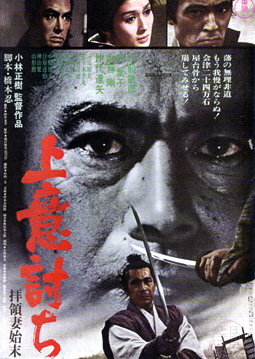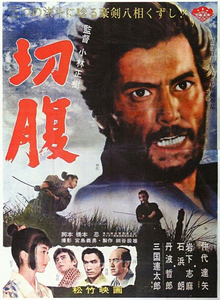 |
| Yunosuke Ito and Keiji Sada in I Will Buy You |
Ippei Tamaki: Yunosuke Ito
Fudeko Tanaguchi: Keiko Kishi
Goro Kurita: Minoru Oki
Ryoko Taniguchi: Mitsuko Mito
Director: Masaki Kobayashi
Screenplay: Zenzo Matsuyama
Based on a novel by Minoru Ono
Cinematography: Yuharu Atsuta
Art direction: Kazue Hirataka
Film editing: Yoshiyasu Hamamura
Music: Chuji Kinoshita
We have come to accept that professional sports is a big and sometimes corrupt business, so that movies about that business, like Jerry Maguire (Cameron Crowe, 1996) and Moneyball (Bennett Miller, 2011), are designed more to show how things work than to serve as exposés. In fact, I think we have to go back to Japan in 1956 and Masaki Kobayashi's I Will Buy You to see a film that really purports to be shocked about the venality behind a supposedly innocent and much-loved game like baseball. In Kobayashi's view, the bidding war over a star college player becomes a nastily cynical exhibition of greed, corrupting everyone, including the player and his family. The central figure in the film is Kishimoto, played by Keiji Sada as an essentially nice guy who is dismayed by what his job, persuading a player named Kurita to sign with the Toyo Flowers, forces him to do. Sada has some of the look and manner of a Gregory Peck (without Peck's ineradicable blandness), making it possible for us to sympathize with the character and also to understand how he can persuade Kurita's wary mentor-trainer, Tamaki, that he has the player's best interests at heart -- unlike the more ostensibly greedy rivals from other teams. Tamaki is something of a shadowy figure: He may have been a spy during the war, and for most of the film we're not entirely sure that his occasional attacks of pain from gallstones aren't faked, an attempt to win sympathy. He also has a wife and child, but spends most of his time with his mistress, Ryoko, whose younger sister, Fudeko, is Kurita's girlfriend. Fudeko professes to hate baseball, and she is ashamed of her illegitimate birth. Every character in the film, it seems, has a complex backstory. That includes the members of Kurita's family, who live in the country and are mistakenly treated as naive yokels by some of the agents attempting to sign the young player. In the end, the greed of the family even produces brother-on-brother violence. The film ends in irony loaded on irony, capping a well-told and sardonic story.









